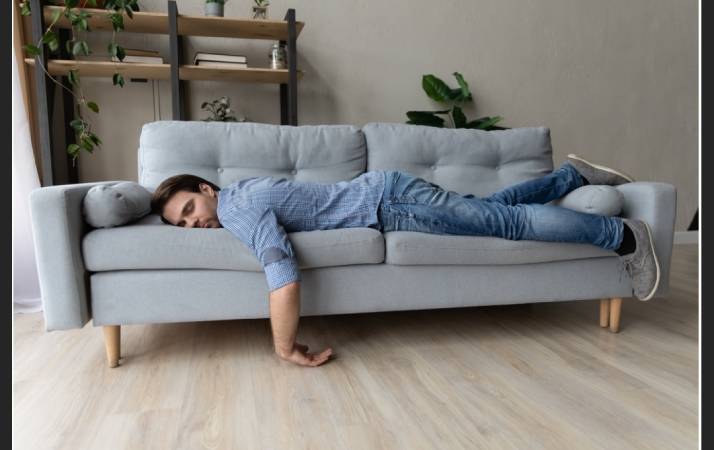In a country where sleep deprivation affects more than 35% of the adult population, it can feel like winning at life if you get an extra hour or two of sleep each night — but too much sleep can indicate underlying health issues and even lead to symptoms like fatigue and irritability. But how do you know when enough is enough? Of course, we all know that quality mattresses are important for getting a good night’s rest, but what other physical and mental signs should you look for that could mean you’re sleeping too much? Here are six warning signs to watch out for.
Table of Contents
1) You’re Sleeping More Than Nine Hours a Night
Plain and simple, count the hours. If you’re an adult between the ages of 18 and 64 but regularly sleep more than nine hours a night, you’re probably sleeping too much. While there’s no hard and fast rule about how much sleep people need, c most adults need between seven and nine hours of sleep per night. So if you find that you’re consistently sleeping more than this, it could be a sign that something else is happening.
2) You’re Taking Multiple Naps During the Day
It’s natural to feel drowsy after lunch or in the mid-afternoon, and taking one short nap (30 minutes or less) during this time may be just the energy boost you need. Because, yes, naps are awesome, and none of us should have complained about having to take them when we were young. However, if you find yourself napping multiple times during the day, especially for an hour or more at a time, this could indicate that something’s not right.

3) You Feel Lethargic During the Day
Daytime drowsiness is also an obvious indicator that there may be something wrong with your sleeping habits. If you’re constantly feeling tired throughout the day or find yourself nodding off during activities that don’t require much effort (such as reading a book), then it could mean that your body is getting too many hours of shut-eye.
4) You’re Struggling to Wake Up
Waking up can be difficult for anyone, especially when snuggled into a cozy bed. But if you find it particularly hard to get out of bed in the morning and your energy levels are consistently low, even after lots of sleep, this could be a sign that you’re sleeping too much. Even if you hit the recommended seven to nine hours of sleep each night, you may still struggle to wake up because you spend more time in bed than necessary. Remember, nine hours is the top end, and many of us only need seven.
5) You’re Unable to Focus
Too much sleep can cause a lack of focus and concentration, making it challenging to stay on task. You might feel like you’re in a perpetual state of brain fog and never quite able to think clearly. So, yes, deep sleep is essential for memory and concentration. However, if you find yourself having trouble with focus and concentration despite getting more than the recommended number of hours of sleep, it may be a sign that you need to get more deep sleep, not more sleep, period.

6) You Feel Disconnected from Others
If you feel disconnected from your friends and family or like you’re not living your life to the fullest, it may be because you’re spending too much time asleep. Of course, sleeping is essential, but it’s also important to make time for other things in your life like socializing, working and hobbies. If you find yourself neglecting these things in favor of sleep, it may be time to evaluate what’s going on.
Why Is Too Much Sleep a Problem?
Oversleeping can have some serious effects on our mental and physical health, which can result in less energy overall. When we spend too much time in bed, our body becomes used to it, making it harder to break the habit and keep our energy levels balanced. Sleeping too much can also increase levels of inflammation, which is linked to increased fatigue in general. It has also been linked with various health issues such as depression, diabetes and heart disease — making it important to identify and address any potential issues early on.
Solution: Get Better Quality Sleep
It’s not often that people are trying to figure out how to sleep less. However, it’s not about the amount of sleep but the quality of sleep. So if you find yourself sleeping too much, the best solution is to focus on how to get better quality sleep. Here are some great ideas for making that happen:
● Wind Down with a Routine – When our brains get the signal that it’s time for sleep, it’s more likely that we’ll sleep into deeper sleep cycles like REM and Delta, which are more restorative. Use some quality spa bathroom accessories to help you take a warm shower or bath, ensure the lighting has been dimmed and read a book. It’s not hard, but it is essential.
● Limit Your Caffeine Intake – Caffeine can stay in our system for up to 12 hours, with a half-life of five hours, so it’s important to limit the amount we consume, especially late in the evening or at night. Also, watch out for hidden caffeine in chocolate and other places. It really sneaks up on you if you’re not careful.
● Banish Blue Light Devices – Blue light emitted from devices like your phone and television can interfere with our body’s melatonin production, which is the hormone responsible for helping us regulate our sleep cycles. So be sure to switch off all screens at least an hour before bedtime and try to keep them out of the bedroom altogether. If you absolutely can’t do that, at least check for a night mode that filters out the blue light.
● Invest in Quality Bedroom Essentials – When it comes to bedroom essentials like a great mattress, comfortable linens and supportive pillows, don’t be afraid to splurge a bit. Quality sleep starts with the basics. If you invest in quality items, you’ll end up sleeping better and for less time overall.
Final Thoughts on Too Much Sleep
It’s not that too much sleep is a problem. However, when we feel the need to sleep that much, we’re likely not getting quality sleep. If you find yourself sleeping longer than the recommended amount for your age group, look at your lifestyle and see if any changes could help improve your overall sleep quality. With some minor adjustments to your environment and habits, you can be well on your way to more restful, productive sleep. And when in doubt, always consult a healthcare professional. Good luck on your journey to healthier sleep!

